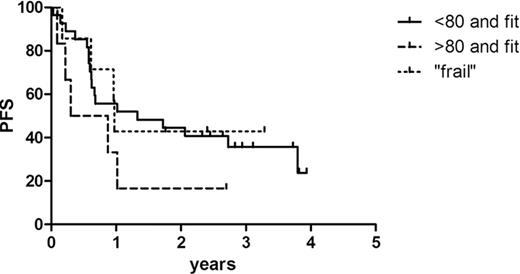Abstract
Abstract 4950
Despite improvements in outcome using chemoimmunotherapy, treating elderly patients with diffuse large B cell lymphoma (DLBCL) remains challenging. Reliable risk stratification beyond age is lacking and consequently elderly patients are often treated with reduced-dose therapeutic regimen with palliative intent. We retrospectively analyzed outcomes of DLBCL patients aged 65 and older treated at the University of Pennsylvania.
We identified 41 patients (pts) with diagnosis of DLBCL and age >65 years. Median age was 74 years (range: 65–86). Eight pts (20%) were age 80 or older. There were no differences in IPI, elevated LDH, or bcl-2 expression, whereas bcl-6 expression was more common in patients >80 years with 75% (6/8) vs. 27% (24/33) (p=0.01).
Overall, 31 pts were treated with R-CHOP, 2 pts with R-HyperCVAD and one pt with R-CVP. Seven patients with a median age of 77 years were considered too frail for standard chemotherapy and were treated with a “split R-CHOP” regimen consisting of: rituximab 375 mg/m2 day 1, cyclophosphamide 375 mg/m2 day 1 and 15, adriamycin 25 mg/m2 day 1 and 15, vincristine 1 mg day 1 and 15 and Prednisone 50 mg day 1–5 and day 15–19.
Overall, the complete remission (CR) rate was 56% with seven treatment related deaths (17%). For patients between 65 to 80 years of age and deemed fit for standard chemotherapy (n=28), CR rate was 57% with four treatment related deaths (14%). Among patients over 80 and deemed fit for standard chemotherapy (n=6), the CR rate was 50% with 2 treatment related deaths (33%). Frail patients treated with the “split R-CHOP regimen” (n=7) had a CR rate of 57% with one (14%) treatment related death.
For all patients, the median progression-free survival (PFS) was 1 year with a median overall survival (OS) of 2 years. The median PFS for pts between 65 and 80 years of age treated with standard chemotherapy was 16 months. Median PFS in pts >80 years of age treated with standard chemotherapy was 7 months, whereas median PFS in frail pts treated with “split R-CHOP regimen” was 11.7 months.
Our data reveal interesting findings about elderly pts treated for DLBCL. PFS and OS in general are poor as has been reported by others. In our data set, pts>80 years considered fit for standard chemotherapy, had a shorter PFS then fit patients between 65 to 80 years.
Intriguingly, PFS among frail elderly patients treated with a “split R-CHOP” regimen appears to be superior to that of elderly deemed more robust who were treated with standard dose RCHOP-21. Though limited by small numbers, our institutional data suggest that frail patients can tolerate a modified R-CHOP regimen although survival remains short.
No relevant conflicts of interest to declare.
Author notes
Asterisk with author names denotes non-ASH members.


This feature is available to Subscribers Only
Sign In or Create an Account Close Modal